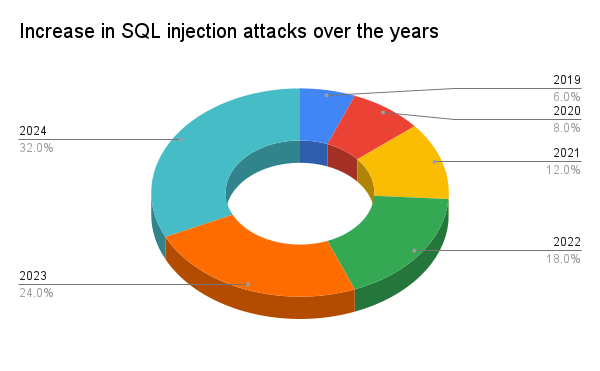Home
Services
Resources
Training
About Us
Blog
Contact Us
Home
Services
Resources
Training
About Us
Blog
Contact Us

In the ever-evolving landscape of cybersecurity, SQL injection remains a formidable threat to data security. Despite advancements in security technologies and practices, SQL injection vulnerabilities continue to compromise businesses worldwide. In this blog, we will explore what SQL injection is, why it is still a critical issue in 2025, and how businesses can protect themselves from this insidious threat. Understanding and addressing these vulnerabilities is crucial to safeguarding your data and maintaining the trust of your customers.
SQL injection is a type of attack that allows an attacker to execute malicious SQL statements that can control a web applications database server. This attack can lead to unauthorized access, data manipulation, and even complete data loss. Essentially, SQL injection occurs when an application fails to properly handle user input, allowing attackers to inject malicious SQL code into queries.
For a broader understanding of web security, check out our web security services.
For more in-depth information, visit the OWASP Foundations SQL Injection page.
Understanding the different types of SQL injection can help you better secure your applications.
Classic SQL injection involves injecting SQL code directly into a vulnerable SQL query. For example, a login form might be exploited to bypass authentication. This type of attack can be used to retrieve, modify, or delete data.
Learn more about classic SQL injection from OWASP’s guide.
In blind SQL injection, attackers infer information about the database based on the applications behavior. Although they do not see the actual data, they can still manipulate the database. This method is often used when error messages are suppressed.
Check out our blog on common web vulnerabilities for related issues.
Time-based blind SQL injection relies on measuring the response time of the application to infer data from the database. Attackers inject SQL queries that cause delays in the applications response, providing clues about the databases structure.
Error-based SQL injection involves injecting SQL queries that trigger errors in the application, revealing information about the database structure or other sensitive details. This method exploits the applications error handling mechanisms.
For more on error handling, read our blog on secure coding practices.
Examining real-world examples can highlight the severity of SQL injection vulnerabilities.
In 2025, a major retailer experienced a significant data breach due to SQL injection. Attackers accessed sensitive customer data, including credit card information and personal details. The breach led to massive financial losses and reputational damage.

Another incident in 2025 involved a financial institution where attackers exploited SQL injection to alter transaction data. This manipulation impacted the integrity of financial records and led to significant regulatory fines.
Average Cost of SQL Injection Attack (USD).png)
SQL injection can have dire consequences for businesses, including:
SQL injection attacks can result in substantial financial losses due to data theft, regulatory fines, and legal fees. The costs associated with data breaches are often staggering, encompassing not only direct financial losses but also costs related to incident response, recovery, and reputational damage.
Check out this report on financial losses from data breaches.
A data breach can severely damage a companys reputation, eroding customer trust and leading to lost business opportunities. The long-term effects of reputational damage can be profound, affecting customer retention and brand value.
Learn how to protect your brand with our cloud security services.
Businesses may face legal actions and compliance issues if they fail to secure their data adequately. Regulatory bodies may impose fines or sanctions for failing to comply with data protection regulations, such as GDPR or CCPA.
Preventing SQL injection requires a combination of technical measures and best practices. Here’s how you can protect your applications:
Prepared statements ensure that user input is treated as data, not executable code. This approach effectively prevents SQL injection by separating SQL logic from data.
Read more about secure coding practices in our API security services.Validate and sanitize all user inputs to ensure they meet expected formats and values. This practice helps prevent malicious data from being processed by your application.
Learn more about input validation from the OWASP Foundation.Keep all software and libraries up-to-date to protect against known vulnerabilities. Regular patching is essential for maintaining the security of your applications and systems.
For ongoing security management, explore our network security services.Regular security audits and penetration testing help identify and address potential vulnerabilities before they can be exploited. These assessments are crucial for maintaining a robust security posture.
Schedule a security assessment with us through our contact page.Our team of experts specializes in identifying SQL injection vulnerabilities through thorough testing and analysis. We employ advanced tools and methodologies to ensure your applications are secure.
Explore our training for a detailed overview of what we offer.
We don’t just react to threats; we anticipate them. Cyserch implements proactive measures to safeguard your applications, ensuring that SQL injection attacks are blocked before they can compromise your data.
Schedule a consultation today on our contact us page.
Cyserch offers continuous monitoring services to detect and respond to threats in real-time. Our security operations center works 24/7 to keep your business safe from evolving cyber threats.
Learn more about our support services in our about section.
SQL injection remains a critical security threat in 2025, with the potential to cause severe damage to businesses. By understanding the types of SQL injection attacks, recognizing the potential consequences, and implementing robust security measures, you can protect your data and maintain the integrity of your systems. Stay vigilant, keep your software updated, and invest in security solutions to defend against this persistent threat.
Ans: SQL injection is a technique used by attackers to manipulate SQL queries and access unauthorized data. It works by injecting malicious SQL code into a query executed by the application.
Ans: Businesses can protect themselves by using prepared statements, validating user inputs, and conducting regular security audits.
Ans: Common signs include unusual application behavior, unexpected error messages, and unexplained data changes.